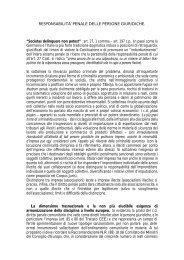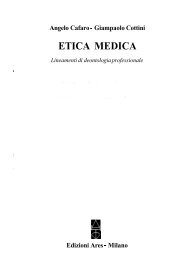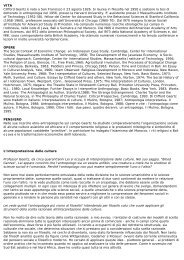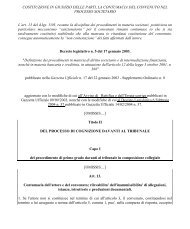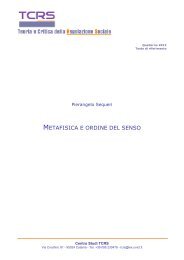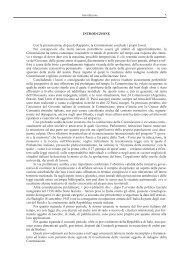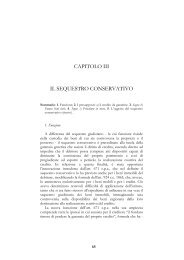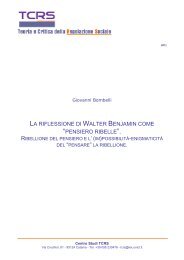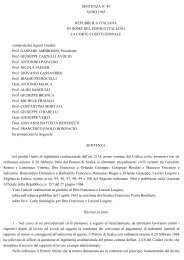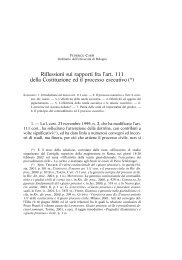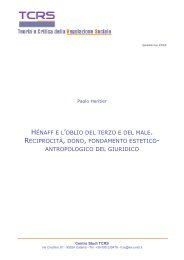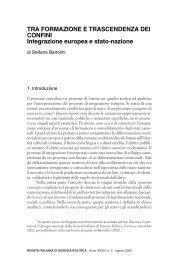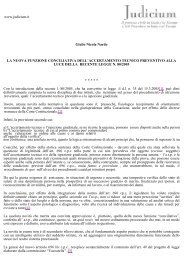FOGLI DI LAVORO per il Diritto internazionale 3 ... - Giurisprudenza
FOGLI DI LAVORO per il Diritto internazionale 3 ... - Giurisprudenza
FOGLI DI LAVORO per il Diritto internazionale 3 ... - Giurisprudenza
Create successful ePaper yourself
Turn your PDF publications into a flip-book with our unique Google optimized e-Paper software.
<strong>FOGLI</strong> <strong>DI</strong> <strong>LAVORO</strong> <strong>per</strong> <strong>il</strong> <strong>Diritto</strong> <strong>internazionale</strong> 3/2008<br />
substantive content and effects of the right – and not only its<br />
legal classification – under the domestic law of the State<br />
concerned (see König, cited above, § 89).<br />
45. The Court observes that the proceedings at issue<br />
concerned the question whether the remaining applicant<br />
associations could prevent the Government from using certain<br />
terms when publicly referring to their religious groups.<br />
According to the domestic courts' case-law, such a right could<br />
be derived from the right to freedom of religion, as enshrined in<br />
Article 4 §§ 1 and 2 of the Basic Law. It remains to be<br />
determined whether this right could be regarded as a “civ<strong>il</strong>”<br />
right within the meaning of Article 6 of the Convention.<br />
46. The Court considers that possible negative consequences<br />
for the applicant associations' financial situation did not form the<br />
direct subject matter of the present proceedings. However, wh<strong>il</strong>e<br />
the Court has found on many occasions that the pecuniary nature<br />
of an asserted right brought a dispute within the ambit of Article<br />
6 § 1 (see, for example, Salesi v. Italy, judgment of 26 February<br />
1993, Series A no. 257-E, § 19, and Woś v. Poland,<br />
no. 22860/02, §§ 76, 77, ECHR 2006-...), this does not mean<br />
that disputes of a non-pecuniary nature necessar<strong>il</strong>y fall outside<br />
the scope of that provision. In this context, the Court draws<br />
attention to its established case-law as to the “civ<strong>il</strong>” character of<br />
the right to enjoy a good reputation (see Helmers v. Sweden,<br />
judgment of 29 October 1991, Series A no. 212-A, p. 14, § 27,<br />
and Tolstoy M<strong>il</strong>oslavsky v. the United Kingdom, judgment of 13<br />
July 1995, Series A no. 316-B, § 58). Furthermore, the Court<br />
has recently held that the right to use state-owned premises for<br />
religious ceremonies had to be considered as directly decisive<br />
for the respective applicant's “civ<strong>il</strong> rights and obligations”, thus<br />
leading to the applicab<strong>il</strong>ity of Article 6 (see Tserkva Sela<br />
Sosulivka v. Ukraine, no. 37878/02, § 42, 28 February 2008).<br />
47. The Court does not find it necessary to determine if the<br />
right to freedom of religion generally has to be considered as a<br />
“civ<strong>il</strong> right” within the meaning of Article 6 § 1. Having regard<br />
to the particular circumstances of the case, in particular its<br />
relation to the applicant associations' good reputation, the Court<br />
considers that the dispute at issue concerned a “civ<strong>il</strong> right”<br />
within the meaning of Article 6 § 1.<br />
189



